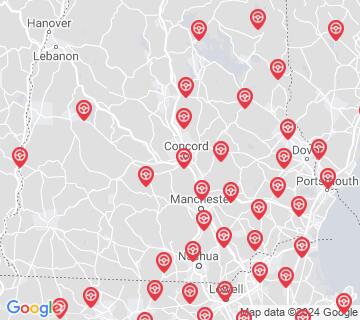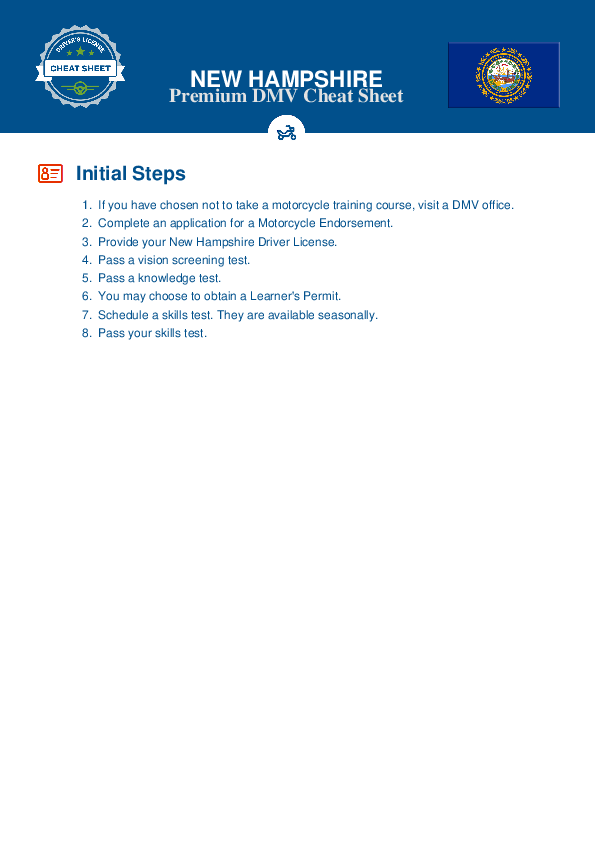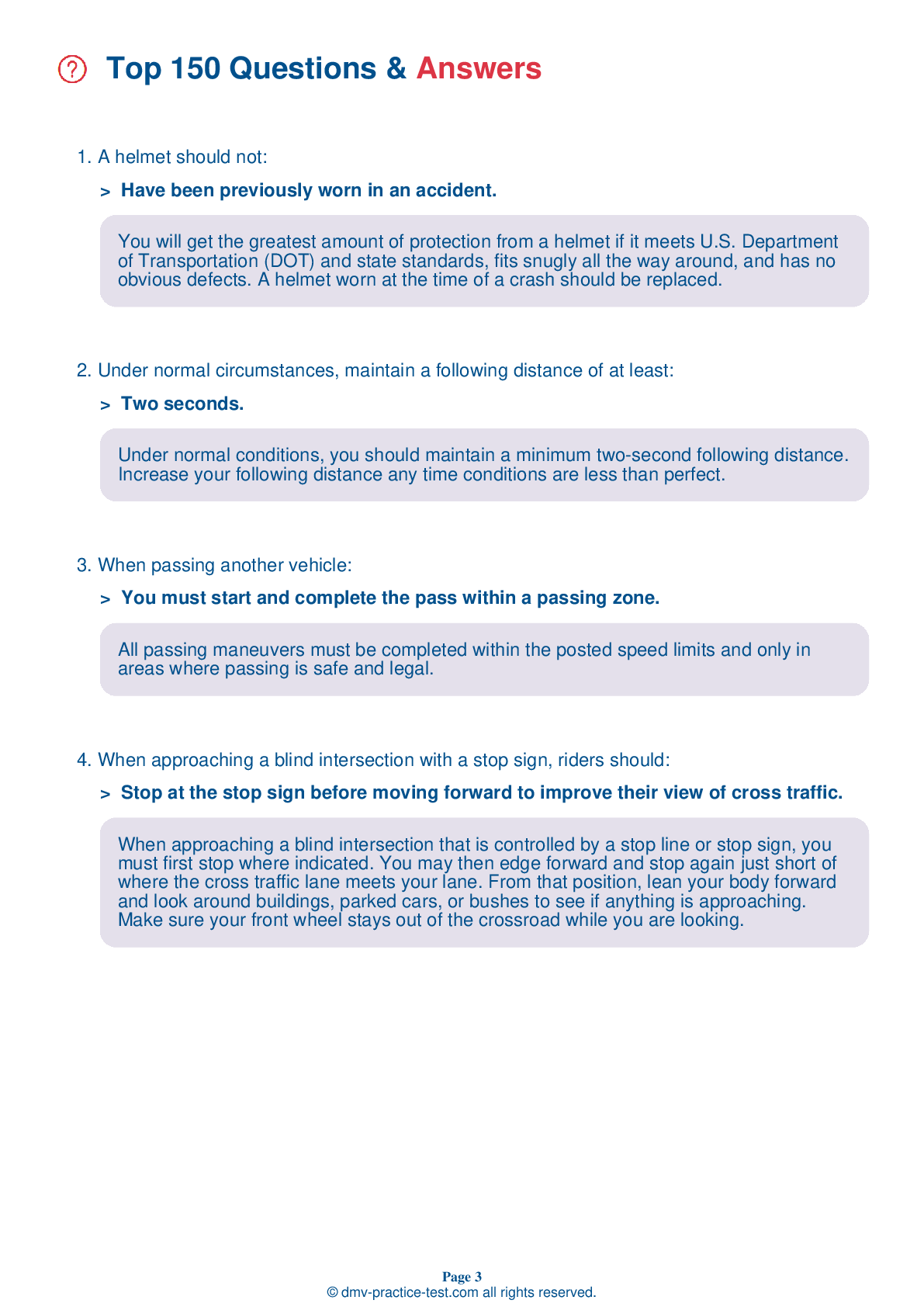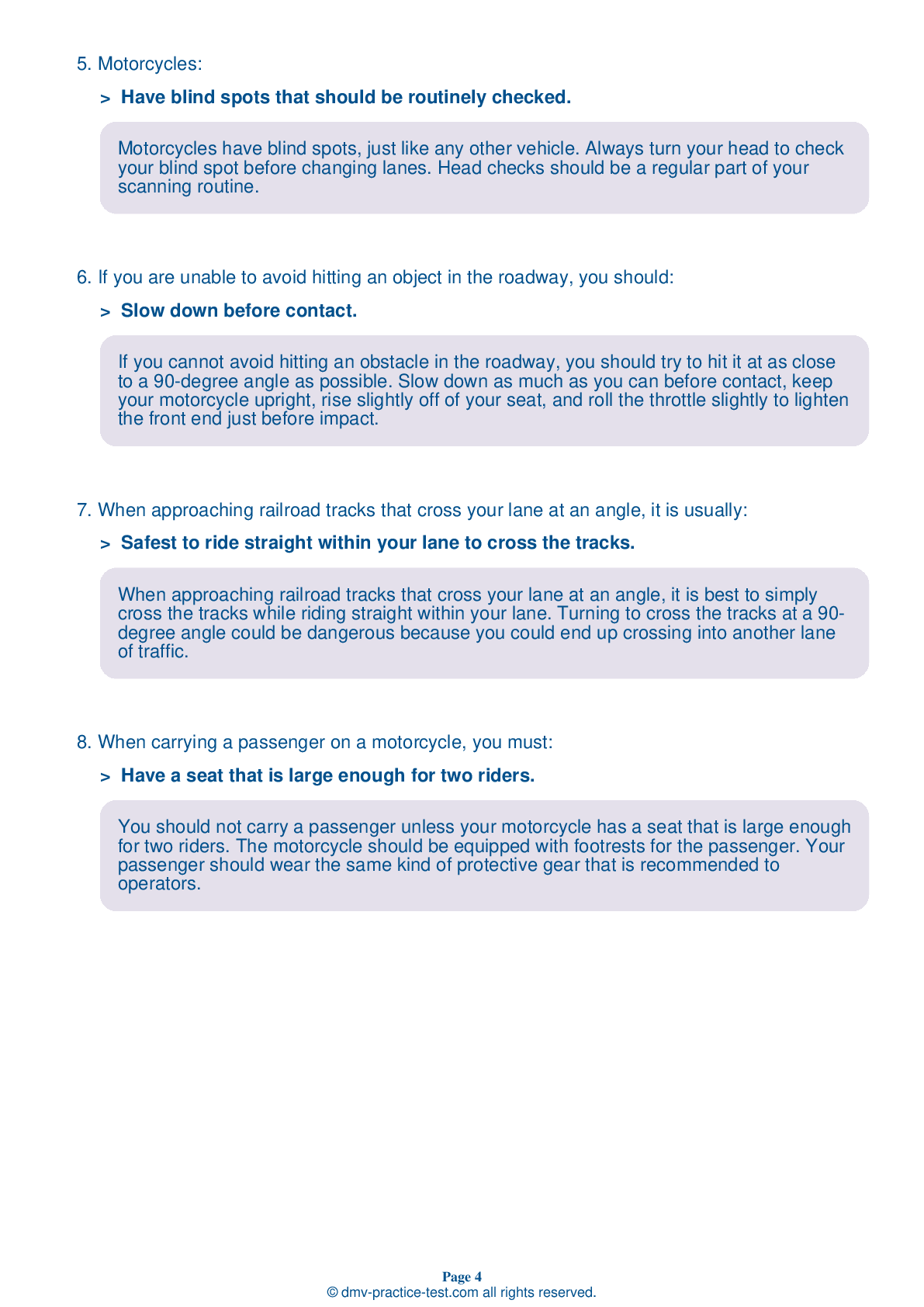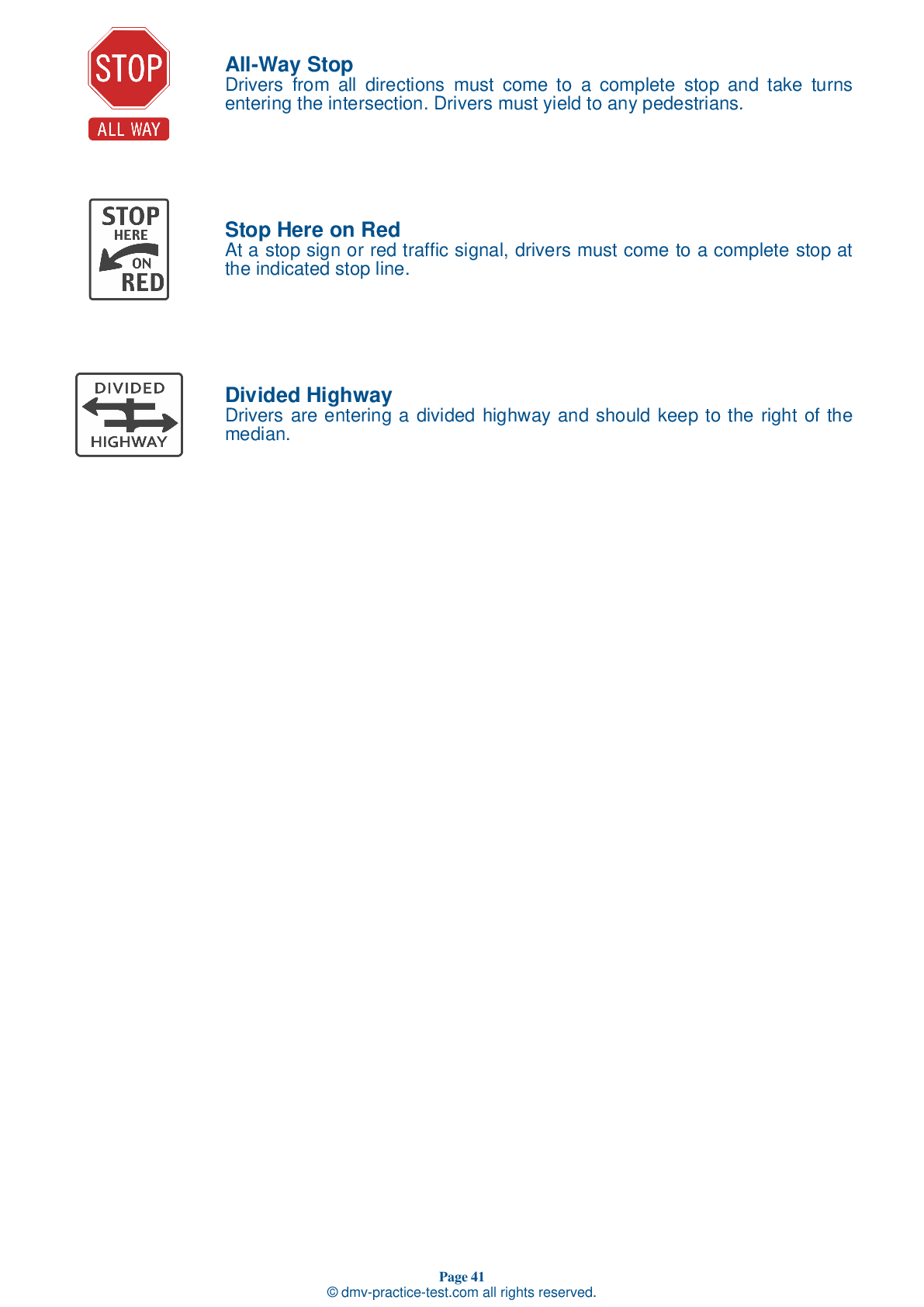DMV Permit Test #6
Motorcycle Test | License NH 2026 | FREE Online Practice! #6 Page 4 of 4
Take this FREE motorcycle test (license in NH 2026) to check your knowledge of the road rules. To improve your results, download a motorcycle handbook online, study theory, and practice for free on our website. Still worried about how to get a motorcycle license in New Hampshire in 2026? Check our website for more sample tests, train as much as possible, and boost your grades!
25
20
16
19 . If you are unable to avoid hitting an object in the roadway, you should:
Stay seated on the motorcycle.
If you cannot avoid hitting an obstacle in the roadway, you should try to hit it at as close to a 90-degree angle as possible. Slow down as much as you can before contact, keep your motorcycle upright, rise slightly off of your seat, and roll the throttle slightly to lighten the front end just before impact.
20 . When approaching railroad tracks that cross your lane at an angle, it is usually:
Safest to cross the tracks by riding on the shoulder of the road.
When approaching railroad tracks that cross your lane at an angle, it is best to simply cross the tracks while riding straight within your lane. Turning to cross the tracks at a 90-degree angle could be dangerous because you could end up crossing into another lane of traffic.
21 . When riding with a passenger, you should:
Try to squeeze into smaller gaps in traffic.
The added weight of a passenger will affect the handling of your motorcycle. Expect your motorcycle to accelerate more slowly than usual, turn more slowly than usual, and require extra space to come to a complete stop. Ride more slowly, start slowing sooner when approaching a stop, open up a larger space cushion, and wait for larger gaps when crossing, entering, or merging into traffic.
22 . When traveling in heavy traffic, maintain a minimum ______ following distance.
One-second
An expanded cushion of space is needed if your motorcycle will take longer than normal to stop. If the pavement is slippery, if you cannot see through the vehicle ahead of you, or if traffic is heavy and another driver may try to squeeze in front of you, open up to a minimum three-second following distance.
23 . If you must brake and swerve to avoid a hazard, you should:
Try instead to use only the brakes.
If you must brake and swerve to avoid a hazard, you should perform both actions separately. Brake then swerve, or swerve then brake. Do not do both at the same time.
24 . Impairment from alcohol:
Occurs only if you have had multiple drinks.
As little as one drink can have a significant effect on the abilities that you need for safe riding. You can be impaired even if you are well below the legal blood alcohol limit. No amount of alcohol is safe to consume before riding.
25 . The best way to stop quickly is to:
Use both brakes simultaneously.
To stop quickly, apply both brakes at the same time. Apply the brakes firmly and do not panic if the brakes lock.
Search the best driving school in your neighbourhood
2026 New Hampshire | Frequently Asked Questions
In New Hampshire, to get a motorcycle license, you must first have a valid driver's license. Then, you'll need to pass a vision test and a motorcycle knowledge test to get a motorcycle learner's permit. After practicing with the permit, you can take the motorcycle skills test. If you pass, you'll receive your motorcycle endorsement. Alternatively, completing an approved motorcycle rider training program can waive the skills test.
In New Hampshire, the minimum age for obtaining a motorcycle driver's license is 16 years old. However, if you're under 18, you must also complete a driver's education course, have parental or guardian permission, and pass both a written and motorcycle skills test. Always remember to wear a helmet for safety while riding.
Yes, in New Hampshire, you need a dedicated motorcycle license or an endorsement on your regular driver's license to operate a motorcycle. To get this, you need to pass a written test, a vision screening, and a motorcycle skills test. If you're under 18, you also need to complete a driver's education course and have parental or guardian permission.
When applying for a motorcycle license in New Hampshire, you'll need a valid New Hampshire driver's license, proof of identity (like a birth certificate or passport), and proof of residency. If you're under 18, you'll also need parental permission. If you've completed a motorcycle training course, bring your completion certificate.
Yes, in New Hampshire, you're required to take a written exam to get a motorcycle license. This test covers various topics including traffic laws, safe riding techniques, and road sign identification. However, if you successfully complete a state-approved motorcycle rider training program, the written and skills tests may be waived.
The motorcycle written test in New Hampshire covers a variety of subjects including motorcycle operation, safety rules, road signs, and laws. It also focuses on safe riding techniques, handling dangerous situations, and protective gear. The test is designed to evaluate your knowledge of New Hampshire's motorcycle laws and safe riding practices. Make sure to review the state's Motorcycle Operator Manual before taking the test.
In New Hampshire, taking a motorcycle training course does not substitute the written test. However, successful completion of a Basic Rider Course (BRC) can waive the practical motorcycle skill test. The written test is still mandatory to ensure you have a thorough understanding of road rules and regulations pertaining to motorcyclists. Always check with the DMV for current rules.
To enroll in a motorcycle training course in New Hampshire, you need to find a state-approved program such as the Motorcycle Rider Training Program. You can register online or over the phone. The course fee is usually due at the time of registration. You'll need a valid driver's license or motorcycle learner's permit to enroll. Courses typically include classroom instruction and hands-on training.
No, you don't have to own a motorcycle for the license test in New Hampshire. You can use a borrowed motorcycle as long as it is properly registered, insured, and safe for road use. However, you must be comfortable and familiar with the motorcycle you'll be using for the test.
Yes, you can use a friend's motorcycle for the driver's license evaluation in New Hampshire. However, the motorcycle must be registered, inspected, and insured. Furthermore, you must have a motorcycle learner's permit and the motorcycle must meet the state's safety standards to be eligible for the road test.
Yes, the New Hampshire motorcycle driving exam tests various handling skills. These include starting and stopping, turning and swerving, and quick stops. Also tested are skills such as negotiating intersections and curves, maintaining proper speed, and demonstrating safe driving habits. The aim is to ensure the rider's ability to safely operate a motorcycle under different conditions.
New Hampshire doesn't impose specific limitations on new motorcycle drivers. However, it's recommended that new riders take the Motorcycle Rider Training Program, which provides valuable skills and safety tips. Also, remember that while New Hampshire doesn't require helmets, other states do, so always wear one for safety and to comply with varying laws.
Yes, your New Hampshire motorcycle license allows you to operate a motorcycle out of state. Most states recognize out-of-state motorcycle licenses. However, you should still familiarize yourself with the specific motorcycle laws in any state you plan to visit, as they can vary and may have different requirements or restrictions.
In New Hampshire, motorcyclists over the age of 18 are not legally required to wear a helmet. However, the state strongly recommends wearing one for safety reasons. Riders under the age of 18 must wear a helmet. Despite the law, it's always a good idea to wear a helmet to reduce the risk of serious injury.
In New Hampshire, there are two types of motorcycle licenses: a motorcycle-only license and a motorcycle endorsement on an existing driver's license. The motorcycle-only license is for those who only want to operate motorcycles. The endorsement is for those who already have a standard driver's license and want to add motorcycle driving privileges.
Yes, in New Hampshire, you can add supplementary endorsements to your motorcycle license. This typically involves passing additional written and skills tests. Endorsements can include things like operating three-wheeled motorcycles or carrying passengers. Always check with the New Hampshire Division of Motor Vehicles for specific requirements and procedures.
In New Hampshire, the motorcycle written test is primarily administered in English. However, if you need language assistance, it's recommended to contact the New Hampshire Division of Motor Vehicles (DMV) ahead of time. They may provide certain accommodations or additional resources to assist non-English speakers. Always check with the local DMV for specific language services.
An effective strategy to prepare for the New Hampshire motorcycle license test is to study the state's Motorcycle Operator Manual thoroughly. This guide contains all the information you'll need for the test. Practice exams are also available online. Additionally, consider enrolling in a motorcycle training course to gain practical experience and knowledge.
In New Hampshire, the motorcycle written exam is primarily administered in English. However, assistance may be provided for those who do not speak English as their first language. It's advisable to contact the New Hampshire Division of Motor Vehicles ahead of your test to inquire about available language assistance or translation services.
If you don't pass the motorcycle written test in New Hampshire, you can retake it. However, you must wait for ten days before retaking the test. This period is intended for you to review and better understand the material covered in the test. You'll need to pay a retesting fee each time you retake the test.
